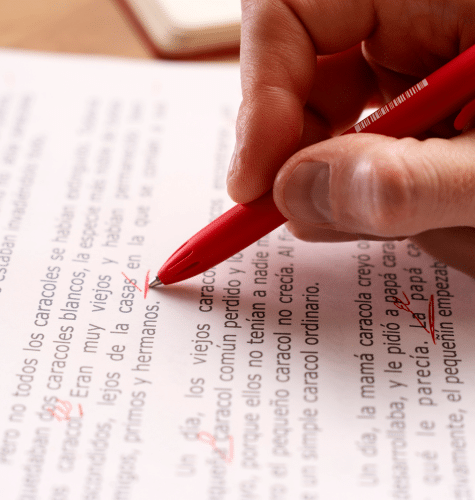There might be a time that your book is in a stage of completion, the excitement of sharing it with readers intensifies. However, there might be minor errors that escape your notice, but significantly impact the overall narrative. These are the overlooked typos, punctuation or grammar issues, or spelling mistakes that required attention and can even have the potential to draw readers away from your story, leaving them with an impression of amateurism.
Even after editing your manuscript to enhance clarity and engagement in the narrative, the possibility of additional refinements may occur. Here, it might be necessary for you to engage in thorough proofreading to guarantee the absence of typing and grammatical errors in your manuscript, ensuring it is polished and prepared for publication.
What Is Proofreading?
Before your book is ready for publication, proofreading involves checking it for typos, grammatical mistakes, punctuation, and general formatting problems. It is the ultimate and most significant stage of the publication process, following all other editing stages, including story-editing, self-editing copy-editing, developmental editing, story editing, self-editing. It guarantees that the story proceeds smoothly and without interruptions. It is error-free to keep the reader’s focus uninterrupted while they immerse themselves in the narrative.
Difference Between Editing And Proofreading
Once you finish writing your book, you may find the need to refine your sentences, ensuring enhanced clarity and an improved quality of your narrative. This process is known as editing. Once the editing phase is complete, attention turns to grammar, spelling corrections, proper punctuation, and formatting. Subsequently, proofreading comes into play as the final stage, ensuring the manuscript is ready for publication by thoroughly addressing small errors.
The difference between editing and proofreading is that, editing focuses on the profound aspects of the book, while proofreading serves as the last checkpoint for meticulous error correction.
Why Is Proofreading Important?
Proofreading serves as a crucial tool for authors in crafting an error-free book that effectively communicates the intended message to readers. A thoroughly proofread book allows readers to be completely captivated by the narrative, swept away into the world created by the author’s words. Little errors can sometimes disrupt this immersion, pulling readers back to reality and potentially causing frustration as they encounter grammar mistakes while moving through the narrative
Ever considered the immense value of punctuation? A manuscript without a proper punctuation can entirely change the intended meaning of a sentence?
“Love, my family, and my friends make life beautiful.”
Now, with a different punctuation:
“Love my family and my friends, make life beautiful.”
In the first sentence, it emphasizes that love, family, and friends collectively make life beautiful. In the second sentence, it suggests that love alone, combined with family and friends, makes life beautiful. The change in punctuation shifts the focus and impact of the statement.
Additionally, thousands of authors eagerly await approval for their books from publication companies and scholarly journals. Unfortunately, many face rejection due to improper or error-filled manuscripts. To make your manuscript stand out, proofreading becomes your ally. A thoroughly proofread manuscript significantly increases your chances of securing approval for book publication.
Apart from all other factors, Proofreading is also essential for safeguarding one’s reputation and enhancing credibility. An error-free and well-crafted narrative not only enhances credibility but also demonstrates the author’s care and dedication to their work. In essence, it is a cornerstone for building and maintaining a positive reputation with your readers.
How To Be Your Own Proofreader?
Take A Break:
After completing your book, it’s important to take a break. Give yourself some time to gain a fresh perspective, shift from an author’s mindset to a reader’s. Taking a break allows you to rewrite with a clearer perspective and make sure your edits improve the reading experience.
Read it out loud:
Do you believe that reading aloud can make it easier to detect spelling errors? Indeed, it can be more beneficial for identifying awkward phrases and catching spelling errors that might go unnoticed during silent reading.
Use Tools:
Using word processor for writing your book can be convenient to automatically correct spelling, punctuation, and grammar errors. However, it’s important to note that sometimes, where it might not catch significant errors. Therefore, complete reliance on it is not advisable.
Print You Document:
Printing your document can be helpful in spotting errors on a hard copy that might have been overlooked on the computer screen. Additionally, it offers a break from screen time, which can be detrimental to eyesight
Get Feedback:
What could be better than having someone new read your novel? Don’t you believe they can spot errors more effectively than the author? A new reader without them familiarity of the author’s text can find errors more effectively than the author himself
Find A Professional Book Editor:
Before enlisting a professional for your book, you might ponder: Why incur the expense of hiring a professional when you can proofread it yourself? What if their approach doesn’t align with my narrative style? What if I end up being dissatisfied with the outcome and find myself repeating the same process again?
Even after proofreading your work several times, it’s possible to miss some errors. In such cases, hiring a professional editor becomes essential. Their objectivity, unbound by your narrative style, allows them to identify errors more efficiently. Professional editors not only ensure your manuscript is free from errors and inconsistencies but also provide a polished, professional touch to your narrative by improving the clarity and coherence of your book, so it may convey the intended message to the readers. Their experience contributes to making your book seamless and distinctive.
Nonetheless, professional editors often engage in effective communication with authors to have a better understanding of their writing style, preferences, and goals for the manuscript. This collaboration allows the editor to provide valuable insights, style recommendations, and further improvements that align with the author’s vision.
The process of going from writing to publication requires careful editing and proofreading in order to create a polished and captivating story. Proofreading plays a crucial part in removing mistakes, drawing in readers, and maintaining the author’s trustworthiness. Self-proofreading strategies are helpful, but hiring a professional editor adds objectivity and improves the final product’s coherence and distinctiveness.











